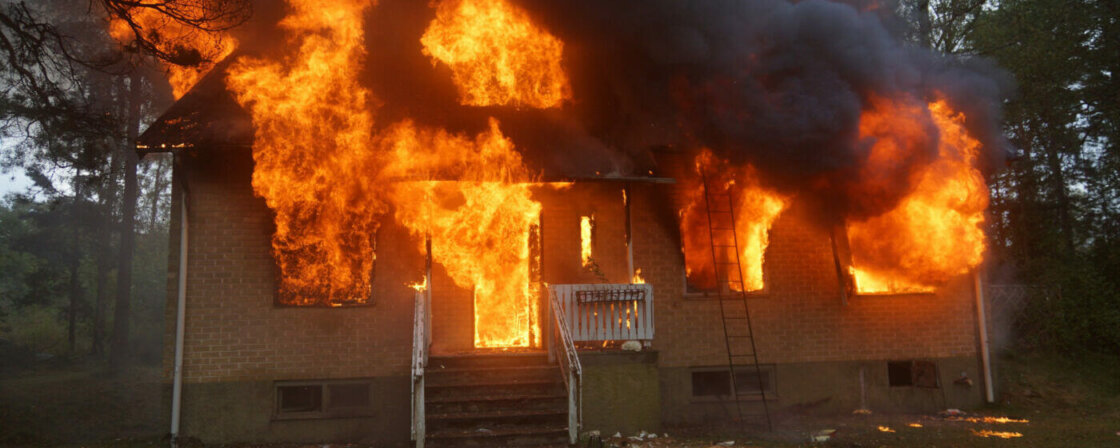Extreme emergency as a circumstance precluding illegality
Extreme hardship is one of the circumstances precluding unlawfulness. It is a circumstance that causes conduct that would normally be considered unlawful (for example, criminal or misdemeanour conduct) not to be considered unlawful in this particular situation. This is not just some physical activity, but also, for example, the use of someone else’s property – e.g. using a weapon against an attacking animal that threatens my life, using someone else’s car to transport a seriously injured person when I am away from civilisation, handing over someone else’s property in, for example, an armed robbery, etc.
For example, imagine a situation where a person breaks down a door to get into a locked apartment. Normally, this would be a burglary offence. A circumstance precluding unlawfulness in this case would be, for example, a situation where a person acted in this way in order to save a young child from an advancing fire.
In total, there are five types of circumstances precluding unlawfulness:
- extreme emergency,
- necessary defence,
- consent of the victim,
- permissible risk,
- justified use of the weapon.
In this article, we will focus on extreme emergency and also compare it with necessary defence, with which they are very similar and often confused.
Are you solving a similar problem?
Are you dealing with an emergency situation?
Describe your problem to us and we will prepare a legal analysis within 48 hours. We will prepare an offer of legal representation and we will fight hard in court to enforce your rights.
I want to help
- When you order, you know what you will get and how much it will cost.
- We handle everything online or in person at one of our 6 offices.
- We handle 8 out of 10 requests within 2 working days.
- We have specialists for every field of law.
Extreme emergency and necessary defence: how do they differ?
Necessary defence is the justified use of force or other means of defence to protect oneself, another person or property from imminent unjustified attack. This intervention is therefore a response to an actual or imminent attack. However, it must be necessary and adequate to repel the attack.
Extreme hardship is then a situation where the action, although in violation of the law, is necessary to avert or minimize danger to persons or property.
The main difference is that necessary defence is a response to an attack (the active conduct of another person), whereas extreme emergency is not an attack, but generally any imminent danger that may be caused, for example, by natural phenomena or technical defects.
Tip for article
Tip: You can read more about the necessary defences in a separate article.
Unlike necessary defence, where it is assumed that the defender can choose (almost) any means to quickly, effectively and definitively repel the attack, in case of extreme emergency the law is a bit stricter. A greater demand is placed on the actor in the sense that he or she should seek to avert the danger in the first place by other means. Thus, if you can choose, for example, to flee at the time without too much difficulty, you may not be recognized as acting in extreme emergency. How you averted the emergency and what your other options were at the time will be the subject of the investigation.
Extreme emergency – definition and conditions
As we have already mentioned, extreme emergency is a condition where a person commits an otherwise criminal offence or misdemeanour in order to avert a danger to an interest protected by the law and has no other means of averting that danger. Thus, in the case of extreme emergency, the following conditions are presumed to be met:
Threat to the interests protected by law
Averting a danger that threatens one of the interests protected by the Criminal Code – this danger may have various causes such as a storm, fire, the action of various machines or mechanisms, an attack by an animal (not disturbed by a human being). Health, life, liberty, property or other interests protected by the Criminal Code are threatened.
The danger is immediate and direct
This term means that the danger must be actual and imminent, i.e., that it occurs directly at the moment or is imminent, and cannot be averted by any means other than a violation of the law.
Thus, the law requires that the danger be of such a nature that there is no time or opportunity to summon help or await rescue by other lawful means. This imminent nature of the danger is therefore essential to justify the act of extreme emergency and to make it not criminal.
Thus, it would be an extreme emergency if, for example, you go out for a walk in the woods and are suddenly attacked by an angry dog. There is no one around to help you and you have no way to escape or hide. The only way to save yourself is to use a rock you find on the ground and hit the dog with it. However, when this would not be an extreme emergency is if your neighbour has an aggressive dog that has bitten you in the past. However, the dog is currently locked in the garden behind a fence and poses no immediate danger.
Tip for article
Hint: Extreme emergency can also be found in the Civil Code, which in simple terms states that the person acting in extreme emergency is not obliged to compensate for damages in such a case.
The danger could not have been averted in any other way
Always choose the means that will cause the least damage. If we can easily hide from an attacking animal, for example in a car, then it is certainly not the right thing to do to kill it.
The consequence must be less severe than the threat
The consequence caused must not be as serious or even more serious than the one threatened – if I am threatened with a bite on my calf from a small dog, then I cannot, for example, kill it. This is also a marked difference from the institution of necessary defense, where the degree of consequence is somewhat more benevolent.
The person was not obliged to endure the danger
The person who was threatened with the danger did not, for some reason, have a duty to endure it – for example, certain persons have it in their job description that they are exposed to a certain level of danger (for example, firefighters or police officers).
Extreme emergency – examples
We have already outlined some examples of extreme emergency above, but let’s add some more:
Imagine that you are in a forest. You are lost, you don’t have your phone and you have been wandering for two days. You have no food or water and you feel dehydrated and exhausted. After searching for some time, you come across an abandoned cabin. You decide to break into the hut to get the supplies you need, otherwise you risk not surviving until morning.
Normally, this would be breaking and entering and trespassing (food and water). However, your actions would be judged as an act of extreme emergency. This was to avert an imminent danger to your life and there was no other way to resolve the situation.
Now imagine another situation – You are lost, you don’t have your phone with you and you have been wandering for two hours. You have no food or water on you. However, you come across a water source with drinking water, next to which there is an abandoned hut. You decide to break into the hut to find bottled water and possibly something to eat.
This action would not be judged as an act of extreme hardship. This is because there was no real and imminent danger to justify your action (you really won’t die of dehydration in two hours). Moreover, there was another legal way to get water.
Summary
Extreme hardship and necessary defense are key legal institutions that allow one to act unlawfully in situations of urgent danger. While necessary defence is a response to an imminent attack, extreme emergency refers to situations where the action is not in response to an attack but to another imminent threat to life, health or property. For an action to be considered an extreme emergency, key conditions must be met, such as imminent danger, impossibility of any other solution and proportionality of the means chosen.




